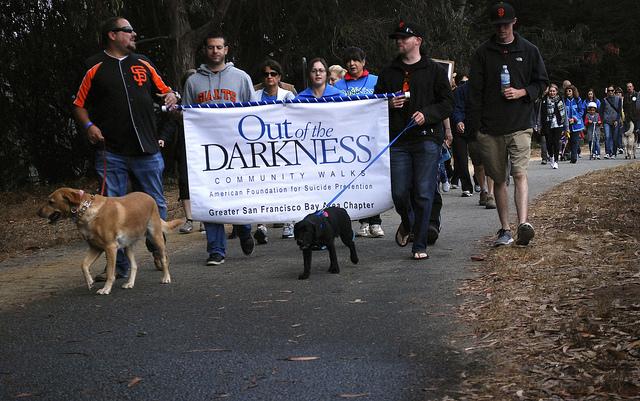
Natalie Meany cheerfully cracked jokes and bantered with the rest of her team, Team Mean, at the 9th annual Out of the Darkness Community Walks Sept. 23 to support the American Foundation for Suicide Prevention.
“There’s no crying here,” the SF State communications major said, smiling. “I formed this team — I did it for closure. After my father’s suicide, I got OK with it enough to do this.” Meany said her father died in 2008.
Suicide is the second leading cause of death for college students, after accidents, UCSF psychologist James Lyda said. He explained a new Interactive Screening Program initiated at UCSF in April and recently implemented at all University of California campuses. Confidentiality is a hurdle that can keep many people from seeking help for depression, Lyda said, and ISP “harnesses the anonymity of the internet” to reach out to at-risk students.
“We want to get to students who fall through the cracks,” he said.

ISP works by surveying all incoming students to a university, identifying those who may be depressed or suicidal, and then reaching out to those students through a school’s counseling department. The entire process is anonymous until students decide to reach out to counselors themselves.
The program is already working. Lyda told the story of a UC student who received an invitation to take the survey when it was first unveiled in April. The student was considering taking her own life, but she was put in touch with counselors, got treatment and is now no longer suicidal.
SF State is a recipient of the same Student Mental Health Initiative Grant that funded ISP at UCSF, Lyda said, and the University may implement the program.
The 15-member Team Mean raised about $4,000 for AFSP before the walk Sept. 23, and Meany’s sister, Megan, was the most successful fundraiser of the group, collecting $1,560 through a social media campaign. At the end of the walk, total donations reached $91,572.
“Last night, I had a girl who I hadn’t talked to since elementary school come to my house and give me $100,” Meany said. “She said, ‘Now you reached your goal,’ and then she left.”
That kind of community support is a big deal for the approximately 1,000 people gathered at the walk. The Greater San Francisco Bay Area chapter of AFSP has been fighting the stigma of mental illness and suicide since it was founded in 2004 and held its first Out of the Darkness Community Walks.
“I’m not sure why there is such a stigma,” said Valerie Kovacovich, area director for the AFSP Bay Area chapter. “There’s a lot of shame associated with mental health issues, but when I tell people that I work with suicide prevention, it’s such a high percentage of people who say ‘Oh my God, I know someone who has committed suicide.’”
About 100 San Francisco residents take their own lives each year, according to the city’s medical examiner, and suicide is the second leading cause of death among college students, according to SF State.
“Every 15 minutes, someone passes away from suicide,” said Blake Simons, an intern at AFSP and a UC Berkeley political science, American studies and business major. Simons said his best friend committed suicide about a year ago, and he struggles with depression, “but you wouldn’t know that unless I told you,” he said. “These issues can affect anyone.”
Research by the American Association of Suicidology suggests that every suicide or suicide attempt impacts at least six other people. Many participants in the Out of Darkness Community Walks, grouped into teams from ranging in size from small families to groups of half a dozen or more, wore the images of loved ones lost to suicide with messages like “dearly beloved,” or “in remembrance.”
“Through more advocacy and more awareness, we can change the statistics,” Simons said.
For students concerned about a friend who may be depressed, Lyda offered some advice.
“Talk to that friend and listen,” he said. “Beyond that, almost every university has a counseling service not only for students who need help but also for those who want to help other students. They can tell you what to say and how to approach it. It’s not something that anybody should have to do alone.”




